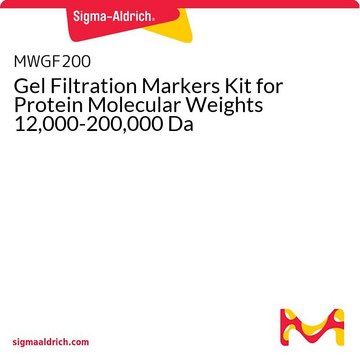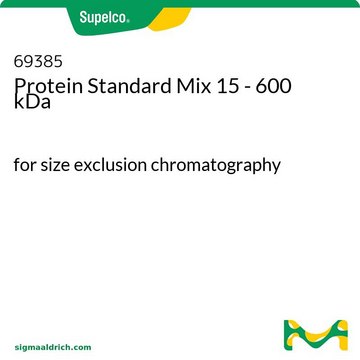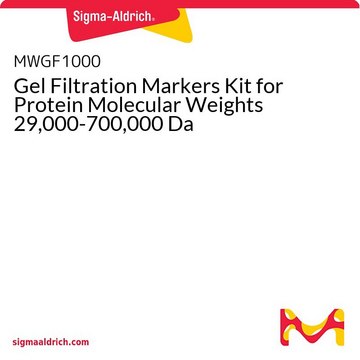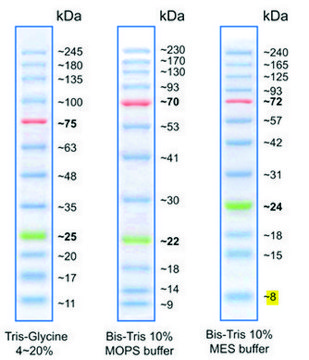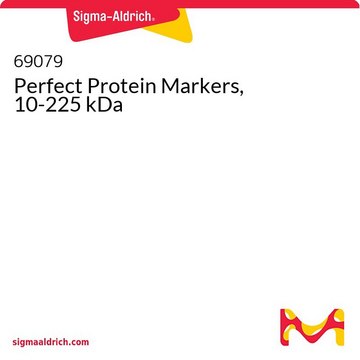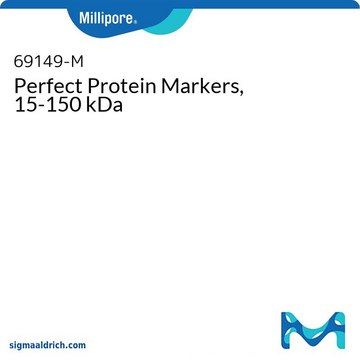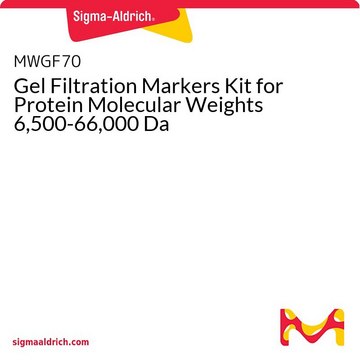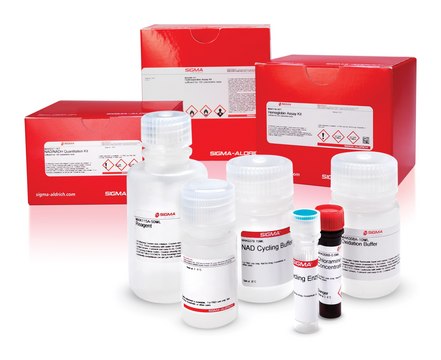MWND500
Kit for Molecular Weights 14,000-500,000 Non-denaturing
Synonyme(s) :
protein markers, protein molecular weight standards, protein standards
Se connecterpour consulter vos tarifs contractuels et ceux de votre entreprise/organisme
About This Item
Code UNSPSC :
41105337
Nomenclature NACRES :
NA.32
Produits recommandés
Catégories apparentées
Application
Kit for Molecular Weights 14,000-500,000 Non-denaturing has been used as a standard for non-denaturing PAGE (polyacrylamide gel electrophoresis) analysis. It has also been used to calibrate columns for gel exclusion chromatography.
Conditionnement
The kit contains 5 vials of proteins (1 mg of each) having a molecular weight range of 14 - 545 kDa and a technical bulletin.
Proteins:
α-Lactalbumin from bovine milk
Carbonic Anhydrase from bovine erythrocytes
Albumin from chicken egg white
Albumin from bovine serum
Urease from Jack bean
Proteins:
α-Lactalbumin from bovine milk
Carbonic Anhydrase from bovine erythrocytes
Albumin from chicken egg white
Albumin from bovine serum
Urease from Jack bean
Reconstitution
Reconstitute the contents of each vial of protein marker with 1ml of water, with the exception of Urease, Catalog Number U7752. Reconstitute the vial of Urease with 0.5 ml of water and mix until the protein is in solution. Then add 0.5 ml of glycerol to the Urease solution to stabilize the protein during freeze thaw cycles. Solutions may be stored at -20 °C for future use. It is recommended that repeated freezing and thawing be avoided. Stock solutions may be dispensed into working aliquots, frozen, and then discarded after 2-3 uses. Immediately before use, thaw an aliquot of each prepared protein marker and dilute with an equal volume of sample buffer.
Produit(s) apparenté(s)
Mention d'avertissement
Danger
Mentions de danger
Conseils de prudence
Classification des risques
Eye Irrit. 2 - Resp. Sens. 1 - Skin Irrit. 2 - STOT SE 3
Organes cibles
Respiratory system
Code de la classe de stockage
10 - Combustible liquids
Classe de danger pour l'eau (WGK)
WGK 3
Point d'éclair (°F)
Not applicable
Point d'éclair (°C)
Not applicable
Faites votre choix parmi les versions les plus récentes :
Déjà en possession de ce produit ?
Retrouvez la documentation relative aux produits que vous avez récemment achetés dans la Bibliothèque de documents.
Les clients ont également consulté
Notre équipe de scientifiques dispose d'une expérience dans tous les secteurs de la recherche, notamment en sciences de la vie, science des matériaux, synthèse chimique, chromatographie, analyse et dans de nombreux autres domaines..
Contacter notre Service technique